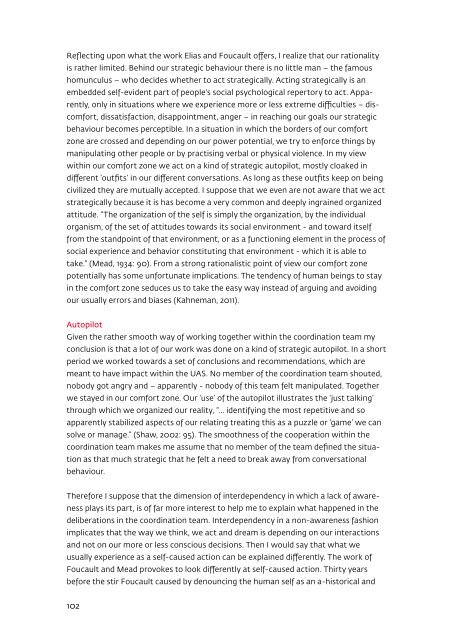Rumbling on performativity_Frits Simon
Rumbling on performativity_Frits Simon
Rumbling on performativity_Frits Simon
Create successful ePaper yourself
Turn your PDF publications into a flip-book with our unique Google optimized e-Paper software.
Reflecting up<strong>on</strong> what the work Elias and Foucault offers, I realize that our rati<strong>on</strong>ality<br />
is rather limited. Behind our strategic behaviour there is no little man – the famous<br />
homunculus – who decides whether to act strategically. Acting strategically is an<br />
embedded self-evident part of people’s social psychological repertory to act. Apparently,<br />
<strong>on</strong>ly in situati<strong>on</strong>s where we experience more or less extreme difficulties – discomfort,<br />
dissatisfacti<strong>on</strong>, disappointment, anger – in reaching our goals our strategic<br />
behaviour becomes perceptible. In a situati<strong>on</strong> in which the borders of our comfort<br />
z<strong>on</strong>e are crossed and depending <strong>on</strong> our power potential, we try to enforce things by<br />
manipulating other people or by practising verbal or physical violence. In my view<br />
within our comfort z<strong>on</strong>e we act <strong>on</strong> a kind of strategic autopilot, mostly cloaked in<br />
different ‘outfits’ in our different c<strong>on</strong>versati<strong>on</strong>s. As l<strong>on</strong>g as these outfits keep <strong>on</strong> being<br />
civilized they are mutually accepted. I suppose that we even are not aware that we act<br />
strategically because it is has become a very comm<strong>on</strong> and deeply ingrained organized<br />
attitude. “The organizati<strong>on</strong> of the self is simply the organizati<strong>on</strong>, by the individual<br />
organism, of the set of attitudes towards its social envir<strong>on</strong>ment - and toward itself<br />
from the standpoint of that envir<strong>on</strong>ment, or as a functi<strong>on</strong>ing element in the process of<br />
social experience and behavior c<strong>on</strong>stituting that envir<strong>on</strong>ment - which it is able to<br />
take.” (Mead, 1934: 90). From a str<strong>on</strong>g rati<strong>on</strong>alistic point of view our comfort z<strong>on</strong>e<br />
potentially has some unfortunate implicati<strong>on</strong>s. The tendency of human beings to stay<br />
in the comfort z<strong>on</strong>e seduces us to take the easy way instead of arguing and avoiding<br />
our usually errors and biases (Kahneman, 2011).<br />
Autopilot<br />
Given the rather smooth way of working together within the coordinati<strong>on</strong> team my<br />
c<strong>on</strong>clusi<strong>on</strong> is that a lot of our work was d<strong>on</strong>e <strong>on</strong> a kind of strategic autopilot. In a short<br />
period we worked towards a set of c<strong>on</strong>clusi<strong>on</strong>s and recommendati<strong>on</strong>s, which are<br />
meant to have impact within the UAS. No member of the coordinati<strong>on</strong> team shouted,<br />
nobody got angry and – apparently - nobody of this team felt manipulated. Together<br />
we stayed in our comfort z<strong>on</strong>e. Our ‘use’ of the autopilot illustrates the ‘just talking’<br />
through which we organized our reality, “... identifying the most repetitive and so<br />
apparently stabilized aspects of our relating treating this as a puzzle or ‘game’ we can<br />
solve or manage.” (Shaw, 2002: 95). The smoothness of the cooperati<strong>on</strong> within the<br />
coordinati<strong>on</strong> team makes me assume that no member of the team defined the situati<strong>on</strong><br />
as that much strategic that he felt a need to break away from c<strong>on</strong>versati<strong>on</strong>al<br />
behaviour.<br />
Therefore I suppose that the dimensi<strong>on</strong> of interdependency in which a lack of awareness<br />
plays its part, is of far more interest to help me to explain what happened in the<br />
deliberati<strong>on</strong>s in the coordinati<strong>on</strong> team. Interdependency in a n<strong>on</strong>-awareness fashi<strong>on</strong><br />
implicates that the way we think, we act and dream is depending <strong>on</strong> our interacti<strong>on</strong>s<br />
and not <strong>on</strong> our more or less c<strong>on</strong>scious decisi<strong>on</strong>s. Then I would say that what we<br />
usually experience as a self-caused acti<strong>on</strong> can be explained differently. The work of<br />
Foucault and Mead provokes to look differently at self-caused acti<strong>on</strong>. Thirty years<br />
before the stir Foucault caused by denouncing the human self as an a-historical and<br />
102



